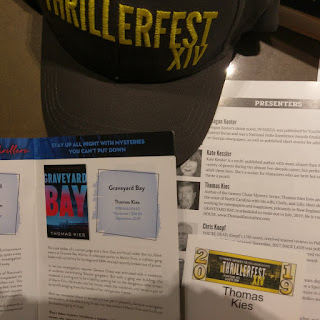I’d never been to Thrillerfest in New
York. I’d heard it was pricy…and it is. Of course it is, it's New York. But it's also the most exciting city in the world.
I’ve been to writers’ conferences that I felt
were worth my while and I’ve attended some that I went home wondering if I
could have done something differently to get more out of it.
 I bit the bullet and registered for
Thrillerfest XIV months ago. Since then,
Sourcebooks acquired my wonderful publisher, Poisoned Pen Press. As fortune
would have it the first night I arrived, they hosted a cocktail party in New
York for their authors (both new and old) as well as inviting members of the media.
I bit the bullet and registered for
Thrillerfest XIV months ago. Since then,
Sourcebooks acquired my wonderful publisher, Poisoned Pen Press. As fortune
would have it the first night I arrived, they hosted a cocktail party in New
York for their authors (both new and old) as well as inviting members of the media.
Hours before the party, I flew into
LaGuardia on Thursday, July 11, took a suicide taxi ride to the Grand Hyatt
Hotel, unpacked and ironed some clothes.
I can never pack without getting my shirts and slacks as wrinkled as the
skin of a mature rhinoceros.
Then I went to the Ballroom in the hotel
for the Opening Reception and was pleasantly greeted by some outstanding
food and drink. The company was damned good as
well. I ran into Dennis Palumbo, Reavis
Wortham, Jenny Milchman, and Joe Clifford as well as meeting many other writers
I didn’t know.
At seven, Dennis Palumbo (a remarkable writer) and I walked
through the rain to the MetLife Building where Sourcebooks/Poisoned Pen Press
was hosting the cocktail event (also awesome food and drink). It was
there that Barbara Peters, Editor in Chief and Founder of Poisoned Pen Press,
introduced all the authors in attendance.
As always, she was effusive in her praise. This gave the PPP authors a chance to interact with individuals from Sourcebooks, who are really knowledgeable and nice.
What really set this event off was that
it was attended by several members of the media including Bookreporter, Mystery
Scene, Publishers Weekly, Strand Magazine, a freelancer working for People
Magazine and two representatives from the New York Public Library.
Speaking of the library, on Friday
during a break I walked to the New York
Public Library building on 42nd Street and went in. I was thrilled to see my book Darkness Lane
on the shelf. Cool beans.
Friday morning, I listened to a panel of
mystery/thriller literary critics talk about the way they work. I found it interesting that some of them
refused to write bad reviews. If they
read a book they didn’t like, they’d either not write something at all, or
would be noncommittal in their overview.
Two of the critics on the panel were definitive that they do, indeed,
write bad reviews if they feel the work warrants it.
Ouch.
They also discussed how competitive it
is to get noticed in the publishing world and advised that a good publicist was
vital in getting reviewed at all.
On the last day of Thrillerfest, I was on
a panel discussing five year plans for writing.
None of us had one. We all agreed
that we write in the moment and if you try to follow trends, by the time you’ve
finished your book, the trend is over.
 Better to write what you’re passionate
about. I told the audience that if you
write a good story with compelling characters, you’ll do just fine.
Better to write what you’re passionate
about. I told the audience that if you
write a good story with compelling characters, you’ll do just fine.
Oh, and a high point after the panel
discussion? R.G Belsky bought Random
Road and asked me to sign it. He writes
from the viewpoint of a female reporter as well.
All in all, a terrific event. If you think you’re going sell a ton of books
at the event, you’re thinking about it all wrong. It’s all about renewing and creating brand
new relationships. Relationships that
will help you further your career and friendships you will keep for the rest of your life. Writers helping writers.
Was it worth it? Absolutely, no question. I'm going next year!
www.thomaskiesauthor.com
Was it worth it? Absolutely, no question. I'm going next year!
www.thomaskiesauthor.com














